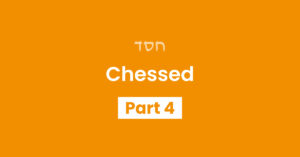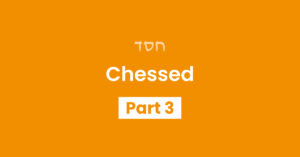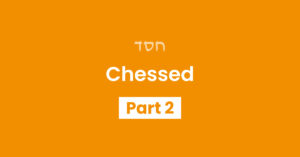What would Hashem think of a person who learns Torah all day, but never lifts a finger to help another person?
The Gemara1 shares quite a surprising and serious opinion on the matter: “Anyone who learns Torah but does not do chessed (acts of kindness) is as if he doesn’t believe in G-d.”
“Anyone who learns Torah but does not do chessed (acts of kindness) is as if he doesn’t believe in G-d.”
Wow, that sounds pretty harsh! Of course we all know it’s good to be a nice person, but why is doing chessed so very fundamental to Judaism? And what does acting kindly have to do with believing in G-d?
THE PURPOSE OF CREATION
To answer this question, we must first understand a fundamental concept in the Torah.
As we explained earlier, the whole purpose of life is that we should recognize Hashem as our Creator, and come closer to Him. But we have a fundamental difficulty in achieving this goal: Hashem is not physical, and His essence is beyond human comprehension. How can we possibly “come close” to Hashem or understand who He really is?
How can we possibly “come close” to Hashem or understand who He really is?
The Sifsei Chaim2 answers this question by differentiating between what “close” means in the physical world, versus what “close” means in the spiritual realm.
When it comes to the physical world, 2 objects are said to be “close” together when there is very little space between them. For example, if you hold an apple in one hand and an orange in your other hand, you can bring them closer together by lessening the physical space between them. But if you would have 2 identical tables that are 50 feet apart, we would say they are “not close” – even though they look exactly the same. The physical distance is what separates them.
By contrast, in the spiritual world, there is no such thing as physical space. So what does spiritual “closeness” mean? In the non-physical world, “closeness” means similarity. The more two things are similar, the closer they are. For example, imagine that Reuven, Shimon, and Levi are each standing 50 feet away from each other. Reuven is thinking “AAAA”; Shimon is thinking “AAAB”; and Levi is thinking “YE47.” Whose thoughts are closest? Clearly, Reuven’s thoughts are “closest” to Shimon’s thoughts, because they are the most similar. The physical distance between Reuven and Shimon makes no difference when it comes to measuring closeness in the non-physical world (i.e. their thoughts).
In the non-physical world, “closeness” means similarity.
Therefore, the Sifsei Chaim explains that if we want to become “close” to Hashem – who is not physical – the only way to do it is through becoming similar to Him. This is the tremendous mitzvah known as “V’Halachta Bidrachav”3 – following in the ways of Hashem. The more we follow in the ways of Hashem, the more we will become close to Him. The way to come close to Hashem is by imitating what Hashem does.
The way to come close to Hashem is by imitating what Hashem does.
THE BEST WAY TO IMITATE HASHEM
So if we want to come closer to Hashem, we need to follow in His ways. But how should we do that? There are so many things Hashem does… Hashem lights up the world, sends down rain, gives us food, makes the plants grow… which of Hashem’s behaviors should we try to imitate?
Chazal4 teach us that if you look around the world and try to understand: Who is my Creator? What is He like?…there is one thing that sticks out most blatantly and obviously in the world: “Chessed Hashem Mal’ah HaAretz – Hashem’s kindnesses fill the earth”5. If your eyes are open, you’ll clearly see that the world is FULL of Hashem’s chessed!
If your eyes are open, you’ll clearly see that the world is FULL of Hashem’s chessed!
There are billions of examples we can give to highlight Hashem’s chessed, but here are a few: Instead of making us see the world in black and white, Hashem gave us the ability to see in color, which is so much more enjoyable. Instead of letting us eat tasteless grey mush for breakfast, lunch, and dinner, Hashem created an awesome variety of foods and drinks for us to enjoy… food can be sweet, crunchy, mushy, salty, or any one of unlimited choices! Our bodies, too, are constant reminders of Hashem’s infinite kindness – every breath we take, every move we make, and every heartbeat is a chessed from Hashem! If you pause and try to think of how many acts of kindness Hashem is doing for you at this very moment, the number is unbelievable.
Why does Hashem do this? Why does Hashem take such good care of us, and give us so many pleasures? Chazal teach us that Hashem’s kindnesses are not just incidental; they are fundamental to who Hashem is and how He chooses to interact with the world. The Ramchal writes6 that Hashem created the world in order to do chessed; Hashem yearns to give us pleasure! The ultimate place for us to experience this pleasure is in Olam Haba, but in this world, too, Hashem showers us with a constant stream of kindnesses and assistance whenever we need it.
Hashem created the world in order to do chessed; Hashem yearns to give us pleasure!
Therefore, returning to our original point – if we want to come close to Hashem, the best way to do it is by becoming similar to Him, through imitating what He does. And what is the primary thing Hashem does all day long? The main thing Hashem does is acts of kindness, as it says: “Chessed Keil Kol HaYom – Hashem does kindnesses all day long.”7 So if we want to imitate Hashem, we, too, must do acts of kindness. The more we do acts of kindness, the more we will become similar – and therefore closer – to Hashem, which is the ultimate purpose of creation.
The main thing Hashem does is acts of kindness
THE CONNECTION BETWEEN CHESSED AND EMUNAH
Now we can better understand the original quote from Chazal that said: “Anyone who learns Torah without doing chessed is as if he doesn’t believe in Hashem.”
The Sifsei Chaim8 explains that a person cannot possibly recognize and appreciate who Hashem is, unless he develops Hashem’s middos within himself. Hashem loves to do chessed, so in order to understand Hashem, we, too, must do chessed! The more we do chessed on our own – and become giving, generous people – the more we can relate to Hashem – the ultimate Giver – and appreciate who He is. By contrast, a person who is lacking in the middah of chessed cannot possibly relate to Hashem; it’s as if he is lacking in basic emunah, lacking a basic understanding of who Hashem is.
Whenever we do an act of chessed, therefore, we are not just doing a simple nice thing. Every act of chessed is an opportunity to emulate our Creator and fulfill the purpose of creation.
Every act of chessed is an opportunity to emulate our Creator and fulfill the purpose of creation.
Rav Avigdor Miller zt”l used to say9 that whenever we do acts of kindness throughout the day, we should think about how we are emulating our Creator. For example, Rav Avigdor Miller writes that a mother who cleans her baby’s diaper should think about how she is emulating Hashem who washes the “diapers” of Jews who do sins (i.e. Hashem cleans us of our sins). Similarly, when someone goes to work to earn money to support his family, he should think that he is emulating Hashem who supports the entire universe.
This week, let’s practice noticing our opportunities for doing chessed, and thinking about how we are emulating Hashem by doing these acts of kindness. No act of chessed is too small to have a transformative effect on ourselves and on the entire universe.
Sources: [1] Avodah Zarah 17b; [2] Sifsei Chaim: Emunah U’Bechirah Vol. II. pgs. 63-64; [3] Devarim 28:9; [4] as explained by Rabbi Daniel Glatstein in the shiur entitled “Parshas Vayeira: The Astounding Chesed of Avraham“; [5] Tehillim 33:5; [6] Derech Hashem Vol. I. Chp. 2; [7] Tehillim 52:3; [8] Sifsei Chaim: Middos V’Avodas Hashem Vol. I. pg. 296; [9] Rabbi Avigdor Miller Speaks, Vol. II. pg. 215
Your Challenge
While doing an act of kindness today, think of the fact that you are emulating Hashem.
FOR EXAMPLE:
- While serving food to a guest or family member, think of how Hashem, too, provides food for all of His creations.
- While helping someone who is not feeling well, think of how Hashem, too, cares for the sick.
- While doing any act of kindness, think of how Hashem is constantly doing acts of kindness for us all day long. (Try to think of 1 specific chessed Hashem did for you today.)
Torah Questions
- The Gemara (Sotah 14a) explains that we are supposed to emulate Hashem by doing acts of kindness, such as providing clothing for people, visiting the sick, comforting mourners, and burying the dead. …When did Hashem first provide clothing for people? (See Bereishis 3:21)
- …When did Hashem visit the sick? (See Bereishis 18:1)
- …When did Hashem comfort a mourner? (See Bereishis 25:11)
- …When did Hashem bury the dead? (See Devarim 34:5-6)
- Why is taking care of dead bodies considered the ultimate chessed – “Chessed Shel Emes”? (See Rashi on Bereishis 47:29)
- What Hebrew words do we say in Modim (in Shemoneh Esrei) that mean that Hashem is merciful and His kindnesses never end?
Questions to Ponder
- The Tosefta (Pei’ah Chp. 4) says that Tzedakah and Chessed are equal to all other mitzvos. Why? How could that be? Is Chessed even equal to the mitzvah of learning Torah?
- The Midrash Shochar Tov (Tehillim 52) says about anyone who is involved in Torah all day, that it’s as if he is involved in “the chessed of Hashem” all day. What do you think that means?
- Rav Hirsch says that Hashem’s chessed is different from chessed done by human beings, because Hashem’s chessed is always good, whereas man’s chessed isn’t always perfectly good. What do you think it means that man’s kindnesses are not always good? Can you think of a time when you (or someone else) tried to do a chessed but it didn’t turn out to be good?
- The Midrash (Bereishis Rabbah 8:5) says that when Hashem was going to create Adam, some of the angels argued against his creation. The “Chessed” group said to yes create man, since man will do acts of kindness. But the “Emes” (truth) group said don’t create man, because man is sometimes full of lies. Why do you think the Emes group was positioned here to represent the opposite of Chessed?




